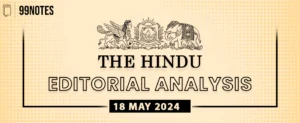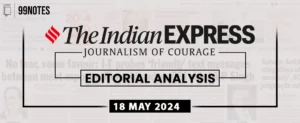Topic: GS2 – Governance – Government policies – Interventions for development in various sectors This topic is relevant for both Prelims and Mains in the context of understanding the dynamics of India’s pharmaceutical industry and the impact of patent laws on access to medicines. |
| Context: |
|
The Role of Generic Pharmaceutical Companies in India:
- Generic pharmaceutical companies in India have historically played a crucial role in providing essential medicines at affordable prices globally.
- Their ability to produce generic versions of patented drugs has been instrumental in lowering costs and increasing accessibility.
Impact of Amended Patent Rules:
- The recent amendments to Indian patent rules have raised concerns about their potential effects on the pharmaceutical ecosystem.
- By making it difficult to oppose patents at the pre-grant stage, the amendments could facilitate easier patenting and lead to an increase in drug prices.
- These changes could undermine the competition that generic companies provide, thus impacting affordability.
Historical Context: Evolution of Indian Patent Law:
- The evolution of Indian patent law, particularly the changes introduced in the early 1970s, allowed India to emerge as a major exporter of generic drugs by the late 1980s.
- However, subsequent international agreements, such as the TRIPS Agreement of 1995, mandated the re-introduction of product patents, posing challenges to India’s generic pharmaceutical industry.
Section 3(d) and Flexibilities under TRIPS Agreement:
- In response to these challenges, India introduced Section 3(d) to its Patent Act in 2005, aiming to prevent the patenting of insignificant modifications of existing drugs. This provision was upheld in the landmark Novartis case.
- Additionally, India amended its patent law to leverage flexibilities provided by the TRIPS Agreement, such as opposition to patents at various stages and compulsory licensing in the interest of public health.
Pressure from Pharma Majors and Impact on Patent Opposition:
- The recent amendments to Indian patent rules have been influenced by pressure from pharmaceutical giants, particularly Western and Japanese companies.
- These changes, including the dismissal of pre-grant oppositions without hearing, could stifle competition, discourage generic companies from opposing patents, and ultimately drive up drug prices.
Financial Burden and Lack of Transparency:
- The requirement for opponents to pay fees for filing oppositions adds a financial burden, potentially deterring patients and civil society organizations from challenging frivolous patents.
- Moreover, the alteration of reporting requirements for patent holders could hinder transparency and accountability regarding the production of patented drugs, making it harder to enforce compulsory licensing.
Conclusion:
- Overall, the amended patent rules in India are likely to prolong the life of patents, increase drug prices, and create barriers to access for patients.
- These changes represent a significant challenge to the principles of affordability and accessibility that are crucial for a functioning healthcare system.
| What is a Patent? |
|
| PYQ: Bring out the circumstances in 2005 which forced amendment to section 3(d) in the Indian Patent Law, 1970. Discuss how it has been utilized by Supreme court in its judgment rejecting Novartis patent application for “Glivec”. Discuss briefly the pros and cons of the decision. (200 words/10m) (UPSC CSE (M) GS-3 2013) |
| Practice Question: Explain the recent changes in Indian patent rules and their impact on access to affordable medicines. Discuss how these changes affect the availability of generic drugs and healthcare affordability in India. (250 words/15 m) |











